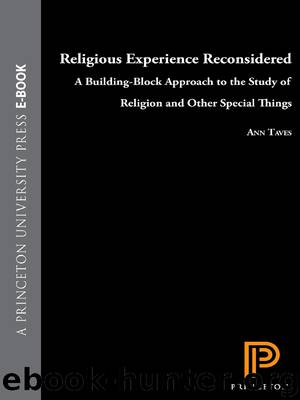Religious Experience Reconsidered by Taves Ann

Author:Taves, Ann
Language: eng
Format: epub
Publisher: Princeton University Press
Analyzing Everyday Explanations (Descriptive Analysis)
If we read Stephen Bradley's narrative as a process, the seemingly straightforward analysis of his heart palpitations as an event that he attributes to the Holy Spirit not only appears much too simplistic but also obscures his underlying attributional dilemma, which has to do with how one knows and can demonstrate to others that one's attributions are actually correct. His underlying dilemma is apparent when we contrast his first conversion experience with his second. The first experience, complete with a brief vision of Jesus with arms extended, feelings of great happiness, and a transformed life, seemed more than adequate until new converts questioned him about it nine years later. The central issue was whether or not he was sure that he “had religion”—that is, knew for sure he had been saved. Although his questioners “knew they had it,” he could merely say that he “hoped” that he did. It was this sense of uncertainty with respect to his first experience that led him to ask them to pray for him, thinking, as he recounts, that if he hadn't “gotten religion” yet, “it was high time [he] did.”
What differed between the two events that allowed him to view the second as more certain and thus more authentic than the first? Oddly enough, given evangelical theology, the difference does not seem to be in the “fruits” of the experiences. In both cases, he felt the requisite sorts of emotions (happiness, indifference to the world, and solemnity in the first instance and happiness, humility, and unworthiness in the second) and evidenced desirable attitudes and behaviors (desire for all to feel as he did and willingness to suffer for Jesus' sake in the first case and desire to tell others of his experience and to pray for their salvation in the second). Instead the difference seems to lie in the strength of the evidence for his causal attributions to unobservable agents. In other words, he seemed to think that the strength of his evidence for concluding that the Holy Spirit engaged him in the second episode was stronger than the evidence that Jesus had appeared to him in the first. Indeed, at the conclusion of his narrative Bradley indicated that he had “discharged a duty” to testify (in effect) to his certainty that “He [God] has fulfilled his promise in sending the Holy Spirit down into our hearts” and he defied “all the Deists and Atheists in the world to shake [his] faith in Christ.” His defiant coda suggests that neither he nor his friends nor deists nor atheists were convinced that Jesus had appeared to him the first time around and that he had opened himself to the conversion process a second time with those attributional difficulties in mind. It was his awareness of these difficulties that, much to the delight of attribution theorists, led him to be so explicit about his attributional process.
In both conversion experiences, his attributional difficulties were centered on unintended and largely unobservable events. In
Download
This site does not store any files on its server. We only index and link to content provided by other sites. Please contact the content providers to delete copyright contents if any and email us, we'll remove relevant links or contents immediately.
The Lost Art of Listening by Michael P. Nichols(6469)
Why I Am Not A Calvinist by Dr. Peter S. Ruckman(3768)
The Rosicrucians by Christopher McIntosh(3049)
Wicca: a guide for the solitary practitioner by Scott Cunningham(2704)
Signature in the Cell: DNA and the Evidence for Intelligent Design by Stephen C. Meyer(2499)
Real Sex by Lauren F. Winner(2474)
The Holy Spirit by Billy Graham(2413)
To Light a Sacred Flame by Silver RavenWolf(2353)
The End of Faith by Sam Harris(2286)
The Gnostic Gospels by Pagels Elaine(2026)
Nine Parts of Desire by Geraldine Brooks(2005)
Waking Up by Sam Harris(1957)
Heavens on Earth by Michael Shermer(1953)
Devil, The by Almond Philip C(1898)
Jesus by Paul Johnson(1887)
The God delusion by Richard Dawkins(1847)
Kundalini by Gopi Krishna(1823)
Chosen by God by R. C. Sproul(1758)
The Nature of Consciousness by Rupert Spira(1688)
